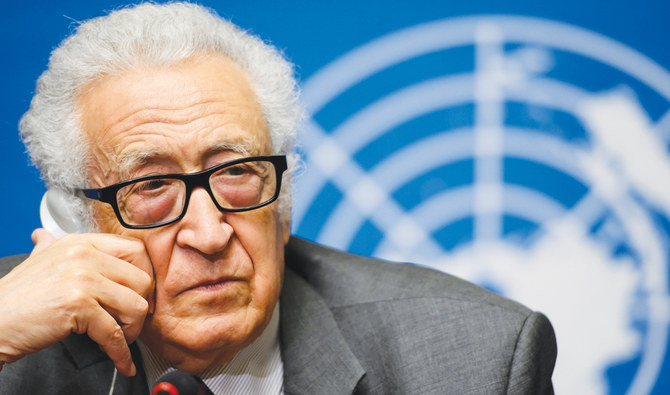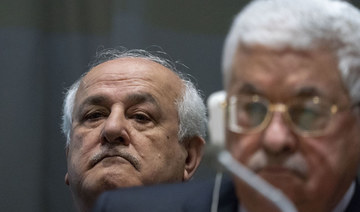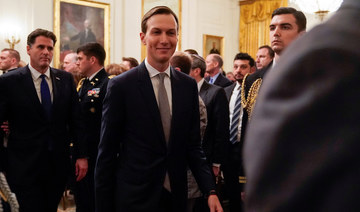PARIS: Former Algerian Foreign Minister Lakhdar Brahimi is a member of The Elders, an independent group of global leaders working for peace, justice and human rights. He has also served as UN special envoy to Syria and Lebanon.
A day after US President Donald Trump unveiled the political component of his long-awaited vision for Israeli-Palestinian peace, Brahimi told Arab News that the proposals amount to an “annexation, domination and apartheid plan.”
Calling for unity among Palestinians, he said they need to be “supported to the best of everyone’s ability.”
Q: What do you think of the US peace plan?
A: The manner in which the plan has been presented was really a stage for (Israeli Prime Minister Benjamin) Netanyahu, who’s facing an election very soon … It has to do with the election in the US, the impeachment (of Trump), with the election in Israel. It’s part of the campaign of both President Trump and Netanyahu. It’s also part of trying to solve their personal problems with justice: Impeachment in one case, a threat of going to jail in the other. It has very little to do with peace in the Middle East.
Q: What does the future hold for the Palestinians if they reject the plan and this US administration is re-elected?
A: The Palestinians are facing extremely serious problems. They’ve been occupied for 70 years now. They’ve been dispossessed. They will continue to be humiliated and dispossessed in all sorts of ways. This condition is very familiar to people who have lived the colonial experience, whether it’s in Algeria or South Africa. This is a situation we’re familiar with, that people don’t listen to you, don’t care about you.
This “deal of the century” considers the Palestinians as sub-humans, or that they don’t exist at all. Netanyahu is going to start implementing decisions he thinks the US president has taken, in particular the annexation of all the settlements, the bank of the Jordan River on the west side.
What Palestinian President Mahmoud Abbas said yesterday is correct — 22 percent of historic Palestine is what’s called the West Bank and Gaza. The Israelis are immediately going to take of that about two-thirds, and perhaps they’ll negotiate with the Palestinians on the one-third left. This isn’t a plan of peace but one of annexation and domination. It’s a colonial plan — apartheid at its worst.
Q: What about Jordan in this plan?
A: Both President Trump and Netanyahu spoke with some respect about Jordan. But to people who have had the chance to read the full text … it seems that even the holy sites, and in particular Al-Aqsa Mosque, aren’t treated with the respect that they said they will be.
Q: Do you think the Trump plan will trigger another Palestinian uprising?
A: I think the Palestinians will have to weigh their options, and how they’re going to resist this brutal additional attack on their aspirations, rights and needs. I don’t know how they’ll do it, but I think we have to understand their position and their difficulties.
Q: Do you think the right of return for Palestinian refugees in other countries is doomed?
A: Let us see what the Arab governments will say in their Arab League meeting. As an Arab, a retired diplomat, I’ll say that the Palestinians are going through extremely difficult times. They have rights that are inalienable, no matter what Mr. Netanyahu does or President Trump says. These rights won’t go away. It’s a long struggle. They (Palestinians) will have to choose the methods of this struggle.
I think the boycott is one of the good things the Palestinians are doing, but they have to make it smart. There are a lot of Israelis who shouldn’t be boycotted; there are a lot of Jews supporting them (Palestinians) in the world. They have to take that into consideration. I think they should look at what the South Africans did and do the same.
Perhaps one thing we have the right to tell our Palestinian friends and brothers (is) to have unity. (Palestinians) have to work together and fight together.
Q: The Palestinian leadership is criticized by the Palestinian diaspora. Is this not because of the leadership’s divisions and corruption? Does it not bear responsibility for the future of the Palestinian people?
A: This isn’t perhaps the time to speak of the failings of some of the leaders of the Palestinian liberation movement. The liberation movement in Palestine has always been divided. It has never been one movement like it was with the Algerians. At times, they (Palestinians) have been able to work together; at other times not so much. Lately, their divisions have been a little too much.
There is a lot of unhappiness among the people about the manner in which the leadership has behaved. There is a lot of talk about corruption. Definitely this has to change. The Arab Spring has been a reality. If it has failed here or there, this doesn’t mean it was a mistake or it wasn’t needed. I don’t think it’s really over. There are legitimate aspirations, and people won’t give up on their aspirations.
Q: What do you think of the European reaction to Trump’s plan?
A: I think an important part of public opinion in Europe is very much aware of what’s happening, and it isn’t happy with what’s happening to the Palestinians. But I’m sure my Palestinian friends won’t mind me saying it’s the level of the struggle in Palestine that will decide how much support they’ll have outside, both in the Arab world and in the West.
If they raise the level of their struggle, organize themselves better, if there’s unity again in their liberation movement, they’ll have much more support (not only) in the Muslim world and in Europe, but also in the US. In university campuses in the US, and among young Jews in particular, there’s more and more sympathy for the Palestinian struggle.
Q: Do you think we will ever see two states — one Palestine, another Israel?
A: I don’t know. What I know is that Palestinians have rights that can be achieved in a two-state solution, or indeed a one-state solution, but not (under) apartheid. The Palestinians are being pushed, funnily enough by the Israelis and President Trump, to a struggle for their rights within one state.














